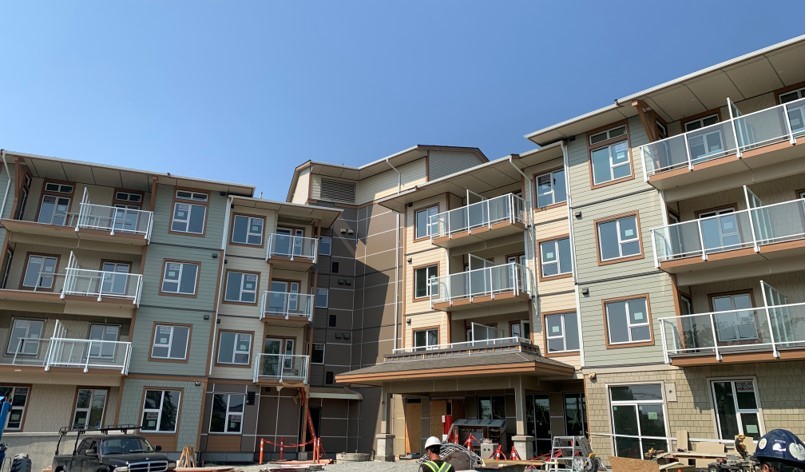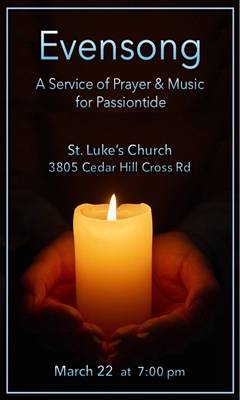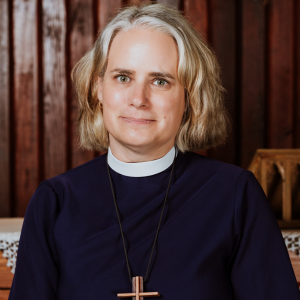In Montreal in October, I had the privilege of participating in and being on a panel at the national conference of the Canadian Alliance to End Homelessness. Over 2,300 people participated in this conference and it was fascinating to see the breadth and depth of experience and knowledge among people working to turn the tide on homelessness in Canada.
Temporary shelters are not true love of neighbour
Back in Calgary, in 2000, the church where I was serving as curate participated in the Inn from the Cold program. Seeing a concerning rise in families experiencing homelessness, churches in the city created a program where we opened our halls and each evening families experiencing homelessness were bussed from a downtown location to whichever (usually suburban) church was offering shelter that evening.
The churches did their best to offer the families a warm meal and a few games and toys before watching these poor families try and put their children to sleep in cots in a church basement. Breakfast was served early, no one got enough sleep, and the buses took the families back downtown, where the older children went on to school.
It was relatively easy to get church volunteers to prepare dinner and breakfast for the families (we only took our turn in the rotation once or twice a month) but it was extremely difficult to find volunteers who would stay overnight with the families. I took my turn at this role, and it would take me days to fully recover from missing a night’s sleep.
Fast forward to 2008 and I was serving on the board of the Calgary Homeless Foundation and chairing regular meetings of the direct service homeless agencies in Calgary. Nurses from the University of Calgary had done a study on the children and families who sought shelter in churches through the Inn from the Cold program and found that a significant number of them were suffering from PTSD. Not surprisingly having to move from church to church every night, not having privacy or stability, is not good for families and children and has lasting effects. Inn from the Cold stopped operating nightly shelters in churches and was able to get permanent shelter spaces for families in a central location.
In hindsight, the incredible effort countless volunteers from a variety of churches put into finding cots and bedding, meals and toys, was not a good use of our time and energy. There was even talk of spending tens of thousands of dollars to add showers at the church I served. In hindsight, all that time and energy should have been used to advocate for a solution to family homelessness that put the needs of the families, not the resources of the church, first. We should have seen that what we could provide in church basements did not reflect our baptismal covenant. It did not respect people’s dignity, it was not justice and it was not true love of neighbour.
We need a housing first approach to homelessness
I tell you this story as it colors all my thinking when churches in this diocese wrestle with how we are called to respond to the rising tide of homelessness in our communities.
Unsheltered homelessness (those sleeping in places not intended for human habitation, i.e. on streets, in parks, in abandoned buildings, in vehicles and in other outdoor locations) has increased 300% in Canada since 2018. Unsheltered homelessness is distinguished from sheltered homelessness (those staying in temporary shelters) and what is termed hidden homelessness (those who are staying temporarily with friends or in a motel or in short-term rentals but who have no assurance of continued residency).
In 2008, when I was serving on the board of the Calgary Homeless Foundation, we adopted a housing first strategy and had the goal of ending homelessness in Calgary within 10 years. Ending homelessness would look like no one being in the shelter system for more than two weeks before being moved to transitional or permanent housing.
Calgary did not entirely succeed in ending homelessness in 10 years. But I do think that their example of working across all levels of government and across all agencies in the homeless-serving system, and towards making sure that no one who is unhoused stays in a shelter for more than two weeks before transitional or permanent housing is offered, is reasonable and aligns with our baptismal covenant to respect the dignity of every human being.
BC needs more non-market housing, and faster
My concern in BC, and in the communities of this diocese, is that we are so very far away from this goal. I am heartened by the incredible work that the diocese is doing to add to the stock of affordable housing in our region. The recent opening of 85 units at Dawson Heights and the project in Duncan to add 110 units at St. John the Evangelist, as well as the good work of the other housing societies in our diocese, are projects we should all be proud of.
However, we need to realise that, according to a report from Marie-Josée Houle, the non-partisan federal advocate for housing, at the current rate of building non-market housing that is affordable for very-low to low income Canadians, it will take at least 1000 years to end homelessness and housing needs in Canada.
Currently, only about 4% of housing in Canada is non-market housing. To solve homelessness in our country we need somewhere between 15% and 20% of our housing stock to be non-market. This should not come as a surprise. We know as a diocese how long it takes to get affordable housing built. Finding the money, getting the property rezoned, getting development permits: it takes years and costs hundreds of thousands of dollars before shovels are even close to being in the ground.
It’s also not suprising that 4% is not enough non-market housing. Think of all the people in your life and community for whom the goal of paying rent on or owning market rate housing is unattainable. For starters, anyone on any form of social assistance or disability support cannot afford market housing. In addition, many serving in the lower rungs of social services, education and healthcare cannot afford market housing. Clergy serving in this diocese have wages that mean that they quality for (but usually cannot obtain, because of long wait lists and other barriers) below market housing in our region.
Housing is a human right, not a luxury
In this issue of Faith Tides, you will hear from Kelly Duncan, the incumbent at St. Andrew’s in Sidney, about their efforts to help the unsheltered homeless in Sidney and how difficult that has been. Kelly and I have had several conversations about that community’s refusal even to open a cold weather shelter. Both of us are clear that the real solution is not cold weather shelters but permanent homes.
Please watch for details of the 2026 John Albert Hall lecture series that the cathedral will host. We are going to bring together people from the homeless serving agencies across the diocese, as well as Irish theologian Siobhán Garrigan. It will be a good time to think about what next steps we are called to take to help our neighbours in this diocese who are experiencing homelessness.
At the conference in Montreal, Tim Richter, the founder, president and CEO of the Canadian Alliance to End Homelessness, said that in Canada we treat housing similarly to way the US treats healthcare. It is a luxury for those who can afford it, instead of a human right guaranteed for all.
The right to housing was passed into law in Canada in 2019. But, as I said earlier, at the current rate of construction we are 1000 years away from having enough affordable housing. May we work together to create a world in which all children of God have a home where there can live in safety and dignity.




